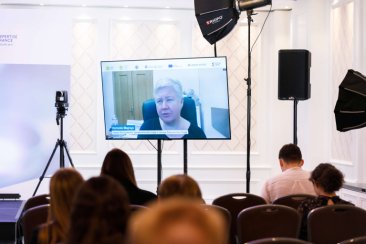Contact center of the Ukrainian Judiciary 044 207-35-46

The largest number of war crimes cases is concentrated in courts located near de-occupied territories, which creates an uneven workload among courts. This was emphasized by Nataliia Marchuk, Judge of the Supreme Court in the Criminal Cassation Court, during the presentation of the report summarizing the third phase of the project “Monitoring of Court Proceedings and Analysis of Court Decisions in War Crimes Cases (under Article 438 of the Criminal Code of Ukraine)”.
Nataliia Marchuk noted that the monitoring results make it possible to understand the actual situation in courts across different regions, identify where the most significant challenges arise, and determine which aspects require greater attention during judicial training activities. One of the key challenges, she stated, is the consideration of cases under special (in absentia) proceedings. In her opinion, it is also necessary to introduce legislative changes that will expand the range of ways to notify suspects and accused of such proceedings, adapted to modern conditions.
The judge also addressed the issue of consistency of judicial practice, noting that differences in the legal qualification of crimes or in sentencing do not necessarily indicate inconsistency, as each case has its own specific circumstances.
.jpg)
According to Nataliia Marchuk, the application of Article 438 of the Criminal Code of Ukraine in its current wording does not generally create difficulties for judges. It enables them to rely on international instruments ratified by Ukraine, as well as other relevant documents, to correctly understand the nature of war crimes. This approach, she emphasized, allows the judiciary to respond flexibly to emerging realities.
In conclusion, the judge highlighted that the quality of court decisions in war crimes cases has significantly improved in recent years — decisions have become more thoroughly reasoned and include references to relevant international documents. This, she stated, is clear evidence of the capacity and resilience of the Ukrainian judicial system in responding to contemporary challenges. She thanked the project organizers and experts for their work, noting that such research serves as a valuable reference both for judicial practice and for educational programmes in the field of justice.
.jpg)
First Deputy Chief of the Staff – Head of the Department for Analytical and Legal Work of the Supreme Court, Rasim Babanly, expressed his gratitude for the high-quality analysis and the tireless work of the experts. He emphasized that such monitoring makes it possible to obtain an objective picture of the consideration of this category of criminal proceedings, since the analysis is conducted by entities independent from the authorities for each specific court case. In other words, it is comprehensive.
The value of the research lies not only in its comprehensiveness, but also in the use of a methodology consistent with the approaches of the European Court of Human Rights regarding the calculation of the duration of judicial proceedings. Thus, the average time for considering cases — from the moment of notification of suspicion to the completion of the trial or appellate review (about one year and several months) — corresponds to international standards established in Article 6 of the European Convention on Human Rights and the case law of the ECtHR.
.jpg)
“Conducting such research is an example of how we can not only respond to challenges after the fact, but also anticipate them by promptly identifying positive and negative trends in the consideration of this category of cases,” he concluded.
The event was organized by the Ukrainian Bar Association, the UBA Human Rights Institute, the International Bar Association, the IBA Human Rights Institute, in cooperation with the EU Project ‘Pravo-Justice’.
.jpg)
Photo courtesy of the organisers.